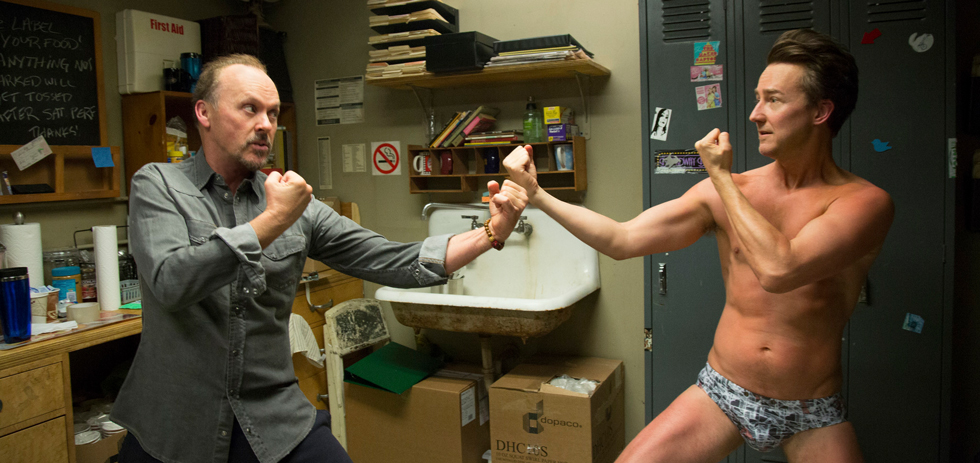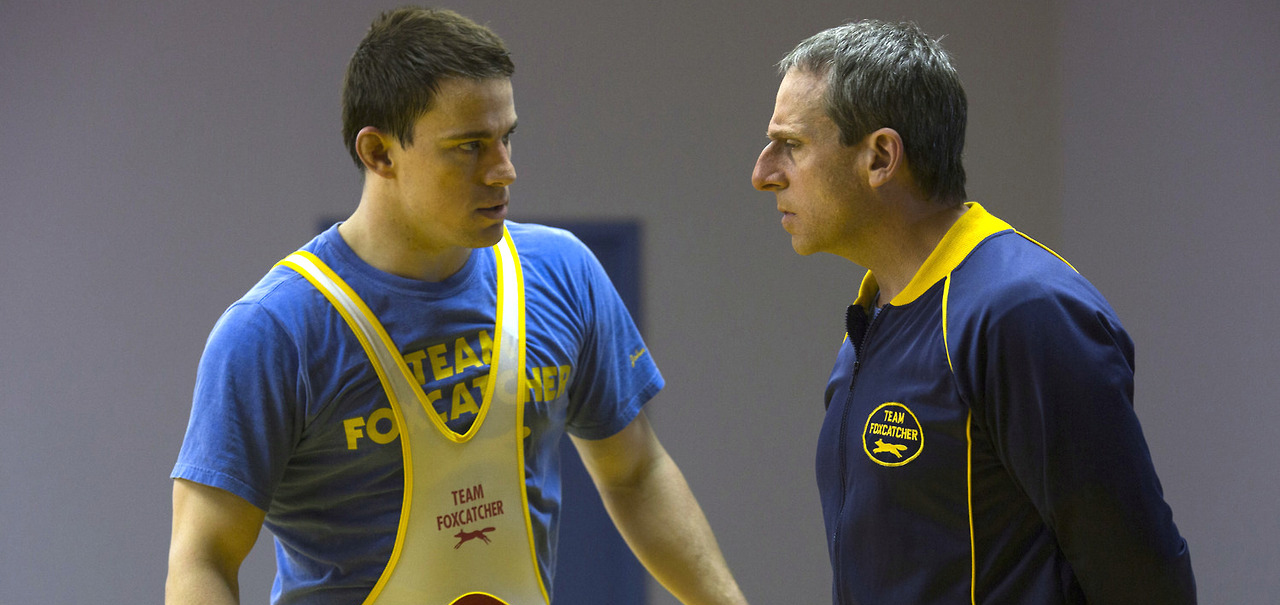In this final dispatch from the 52nd New York Film Festival, one of the year’s gems returns home, a Soderbergh-produced documentary that plays like a high-stakes thriller, and two of this year’s sure-to-be awards-season heavy hitters.
Rounding up the final week, it’d be remiss not to mention the festival’s debut of Alex Ross Perry’s Listen Up Philip (already a hit at Melbourne and Toronto)—a screening that represents a homecoming for its writer-director, cinematographer Sean Price Williams and editor Robert Greene, all former employees of legendary downtown cinephile hangout Kim’s Video. That the film—which might be superficially described as Cassavetes written by Baumbach and shot by Harris Savvides—contains the DNA of the city’s movie greats is no surprise; what’s more impressive is the way both Perry and his collaborators have taken their influences and shaped them into something that feels fresh in form.
Perry’s previous film, 2011’s scrappy but invigorating The Color Wheel, announced a serious writing talent, and afforded a little more resources here he’s stepped up with one of the year’s true marvels. In a performance that makes his Wes Anderson characters seem positively genteel, Jason Schwartzman plays the title role, an obnoxious (to put it mildly) young writer whose glimmer of talent is overwhelmed by his apparent compulsion to destroy every relationship around him—except, perhaps, that with his mentor, a similarly disagreeable old writer played by Jonathan Pryce (how he’s been missed in non-hammy parts.)
What reads as familiar on paper is so dynamic on screen, from the confident, unrepentant writing and Williams’ breathless 16mm cinematography to Perry’s refreshing narrative choices—how, for example, the film boldly switches POV mid-way to follow Elizabeth Moss as Philip’s ex, crafting the sort of proper, nuanced female character that these movies often lack in the process. Moss, significantly, gives one of 2014’s great performances: one unbroken close-up shot, exquisitely held by Williams, in which she transitions through what feels like the entire gamut of human emotion, is the finest piece of acting this side of Scarlett Johansson’s phone call to mum in Lucy.
Acting of the more awards-friendly variety dominates Foxcatcher, the film for which Bennett Miller won the Best Director prize at Cannes and is sure to be one of the season’s most-watched titles for those who attach significance to Oscar punditry. It’s the kind of film where a popular comic actor goes against type with a prosthetic bird-like nose and a “dark,” pseudo-homoerotic performance, where stunt bald patches and receding hairlines stand in for character building, and people do a lot of staring at and/or breaking mirrors because, uh, “duality”?
Cynicism aside, Miller’s film is a solid piece of craftsmanship, and that’s arguably one of its drawbacks. In telling the sort-of true story of a US Olympic wrestler (Channing Tatum) and his troubled, tragic relationship with the wealthy creep (Steve Carell) who tried to own him, Foxcatcher takes an inherently absurd scenario and renders it muted for a middlebrow audience. Given the story’s surfeit of easy marks—or “low-hanging fruit,” as Miller put it during the festival press conference—it’s to the filmmakers’ credit that they’ve hesitated to unleash armchair psychology on their characters. But reluctance can come at a cost: there’s only so much solemn grey photography, dreary piano score and low-level thematic angst a filmmaker can paper over something before the underlying weirdness threatens to bust out, and there are stretches in Foxcatcher where one wonders what a less-tasteful artist could have done with this material.1 Still, there’s plenty to sink into here—Carell, Tatum and Ruffalo are all good, goofy make-up or not—and the film’s thematic wrestling with family, capitalism and power is hardly the most egregious of the year’s American cinema.

Executive produced by Steven Soderbergh, Laura Poitras’ CITIZENFOUR is a formally unusual documentary with a crisscrossing tableau of international tension that recalls the EP’s own Contagion. The third in Poitras’ post-9/11 trilogy, CITIZENFOUR chronicles the emergence of—and subsequent hunt for—former National Security Agency data analyst Edward Snowden, who memorably went public last year with information revealing the US government’s chilling, wide-ranging surveillance of its citizens.
Building up from Poitras’ initial online exchanges with Snowden and moving into his association with Guardian journalist Glenn Greenwald, the documentary is there—or convincingly purports to be, anyway—as Snowden paces his Hong Kong hotel room like a fugitive, pondering his next move while the international media frenzy waits to explode. It’s fascinating, unnerving stuff, and yet so much of this on-screen information processing feels like it might be better served as a TV doco—or better still, a web series where it’s more likely to be seen by the wide audience it deserves (ah, the ironies of modern cinemagoing.) That said, Poitras does a considerable job of pacing this to play like a thriller, and it’s easy to see this getting a narrative Hollywood makeover with Ryan Gosling as the sexy patriot hunk on-the-run.
Finally, whatever to do with Alejandro Gonzales Iñárritu’s wild, contradictory, more-often-than-not electric Birdman?2 The festival’s closing night gala film, Birdman stars the great Michael Keaton as a two-decades-on, has-been superhero star—metakapow!—making a bid for credibility by staging an adaptation of a Raymond Carver novel for Broadway. Captured in one digitally phony, but still technically dazzling “take” by Emmanuel Gravity Lubezki, the movie follows Keaton’s Riggan Thompson and his synecdoche-y life-cast – Method asshole co-star Edward Norton, burnout daughter Emma Stone, “hysterical actresses” Naomi Watts and Andrea Riseborough – as they run through turbulent preview shows leading up to the play’s opening. At the same time, Thompson – who may or may not have telekinetic powers – is haunted by the looming presence of old screen ego Birdman himself, voiced by Keaton in a precise channeling of his Batman persona and resembling, when seen, an Icarus riff on De Palma’s Phantom of the Paradise. All of this is set, for extra urgency, to Antonio Sanchez’s jittery jazz drumming to ratchet up the tension.
Enough to chew on? Birdman clearly has deep things it wants to say about man’s existential crisis, but the unusual beauty of the move is that it—and Iñárritu—doesn’t quite get to stink things up by saying them. Plenty has been said about the film representing a departure for its director, who’s notorious for the jumbled narratives and turgid we-are-all-connected grasping of stuff like 21 Grams and Babel. But that theory doesn’t quite fly, because there’s no questioning Iñárritu is the very same guy—as evidenced by his earnest press conference assertions that the film is about “humans’ need to be loved,” or whatever, and the filmmaker’s ugly brand of sincerity lurks around the corner at every turn like Lubezki’s prowling camera. What has changed are the tools Iñárritu is working with: liberated from the crutch of editing to make things resonate, man, he’s forced to move fast and spontaneously within the parameters established Lubezki and his super-limber performers; every time some weighty, toxic sentiment appears to be descending, the actors push back into comedy, hitting their beat of “truth” while distorting the moment back toward the grotesque. As Edward Norton quipped during the same festival Q&A: Birdman is “a semi-serious film made by deeply unserious people.” And that’s the key to much of the film’s compelling friction.
It scarcely bears noting that Keaton is fantastic. He’s always been one of America’s great (and greatly underserved) actors, and if there’s a new chapter to be found in Birdman it’s that it allows him to cut loose with his entire range as a performer—drawing, inevitably, on his history with the cowl and cape.3 Norton and Stone (who looks possessed in certain scenes) also run riot with their roles, and while Riseborough’s harpy-like shading might be excused for the fact that she appears to be beamed in from space, Watts can’t distinguish between “bad” acting and bad acting (the reason Mulholland Dr. will always be her best role.)
That Birdman ultimately doesn’t know what to do with itself is a telling contradiction—and frankly a pretty exciting one. The movie’s late-stage flailing at critics and franchise blockbusters could be read as sly counter-irony if it were anyone other than Iñárritu (who appears to disdain the concept), and yet his sweaty huffing and puffing to exalt the art of real creation are similarly undermined by the actors’ comic whirligig. Birdman also doesn’t know when to quit a good thing: instead of ending elegantly (where a director less earnest would figure to), Iñárritu compounds the narrative’s uncertainty with a mess of a finale that only repeats things the movie has already said ad nauseam. He keeps swinging for redemption, and the movie—like some unruly superhero alter ego he can’t repress—keeps swinging back at him with a hearty “fuck you.” It’s about time it happened.
